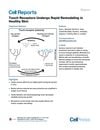 32 citations,
March 2021 in “Journal of endocrinological investigation”
32 citations,
March 2021 in “Journal of endocrinological investigation” Thyroid hormones are important for skin health and changes in them can affect conditions like hair loss and eczema.
 31 citations,
July 2017 in “Clinical Science”
31 citations,
July 2017 in “Clinical Science” MicroRNAs are important for skin health and could be targets for new skin disorder treatments.
 31 citations,
November 2016 in “Cell Reports”
31 citations,
November 2016 in “Cell Reports” Touch sensitivity in mouse skin decreases during hair growth due to changes in touch receptors.
 29 citations,
May 2020 in “npj Regenerative Medicine”
29 citations,
May 2020 in “npj Regenerative Medicine” Immune cells help regulate hair growth, and better understanding this can improve hair loss treatments.
 29 citations,
July 2014 in “PloS one”
29 citations,
July 2014 in “PloS one” Meis1 is crucial for skin health and tumor development.
 27 citations,
August 2014 in “Wiley interdisciplinary reviews. Developmental biology”
27 citations,
August 2014 in “Wiley interdisciplinary reviews. Developmental biology” The skin and thymus develop similarly to protect and support immunity.
 24 citations,
July 2019 in “Journal of Obstetrics and Gynaecology”
24 citations,
July 2019 in “Journal of Obstetrics and Gynaecology” The combination therapy improved PCOS symptoms in both obese and non-obese women, with weight loss in the obese group.
 21 citations,
May 2015 in “The Journal of Steroid Biochemistry and Molecular Biology”
21 citations,
May 2015 in “The Journal of Steroid Biochemistry and Molecular Biology” Progesterone byproduct 5αP stimulates mammary tumor growth, but finasteride can suppress it.
 19 citations,
September 2019 in “EMBO molecular medicine”
19 citations,
September 2019 in “EMBO molecular medicine” Blocking TSLP reduces skin inflammation and cell overgrowth in psoriasis.
 19 citations,
July 2018 in “Medicines”
19 citations,
July 2018 in “Medicines” Juniperus plants contain compounds with potential for developing various medical treatments.
 17 citations,
March 2021 in “Expert Opinion on Biological Therapy”
17 citations,
March 2021 in “Expert Opinion on Biological Therapy” Use PRP and ASC-BT for hair loss and wound healing, but more research needed.
 15 citations,
February 2019 in “Journal of clinical medicine”
15 citations,
February 2019 in “Journal of clinical medicine” Atorvastatin reversed memory problems caused by cancer drug trastuzumab and improved its cancer-fighting abilities without causing hair loss.
 14 citations,
November 2020 in “International Journal of Molecular Sciences”
14 citations,
November 2020 in “International Journal of Molecular Sciences” Advanced therapies like gene, cell, and tissue engineering show promise for hair regrowth in alopecia, but their safety and effectiveness need more verification.
 12 citations,
January 2011 in “Dermatologic Surgery”
12 citations,
January 2011 in “Dermatologic Surgery” Retinoids can prevent skin cancer in high-risk people but have side effects and require more research on dosing and effectiveness.
 11 citations,
July 2014 in “Gene”
11 citations,
July 2014 in “Gene” The S250C variant in a gene may cause autoimmunity and immunodeficiency by impairing protein function.
 9 citations,
July 2018 in “Current Pharmaceutical Design”
9 citations,
July 2018 in “Current Pharmaceutical Design” HO-1 helps skin health and healing but can worsen melanoma; it's a potential treatment target for skin diseases.
 8 citations,
January 2022 in “Burns and trauma”
8 citations,
January 2022 in “Burns and trauma” Skin cell-derived vesicles can help heal skin injuries effectively.
 8 citations,
December 2021 in “International Journal of Family Studies, Food Science and Nutrition Health”
8 citations,
December 2021 in “International Journal of Family Studies, Food Science and Nutrition Health” Extra virgin olive oil may boost the immune system and help fight infections like COVID-19.
 6 citations,
May 2020 in “Scientific reports”
6 citations,
May 2020 in “Scientific reports” Researchers identified genes and proteins that may influence wool thickness in sheep.
 6 citations,
January 2017 in “Advances in Experimental Medicine and Biology”
6 citations,
January 2017 in “Advances in Experimental Medicine and Biology” Runx genes are important for stem cell regulation and their roles in aging and disease need more research.
 5 citations,
January 2021 in “iScience”
5 citations,
January 2021 in “iScience” Using a combination of specific cell cycle regulators is better for safely keeping hair root cells alive indefinitely compared to cancer-related methods.
 4 citations,
February 2021 in “Nano select”
4 citations,
February 2021 in “Nano select” MSC-Exos can aid organ development and offer therapeutic benefits for various conditions.
 4 citations,
April 2021 in “Journal of Cosmetic Dermatology”
4 citations,
April 2021 in “Journal of Cosmetic Dermatology” Intradermal injections improve hair density and thickness better, while derma roller is more convenient.
 3 citations,
June 2023 in “Frontiers in medicine”
3 citations,
June 2023 in “Frontiers in medicine” Oxidative stress may contribute to hair loss in alopecia areata and antioxidants could potentially help as a treatment.
 3 citations,
June 2022 in “Dermatology and therapy”
3 citations,
June 2022 in “Dermatology and therapy” A new botanical treatment improved hair growth and symptoms in lichen planopilaris patients.
 3 citations,
May 2018 in “Biochemical and Biophysical Research Communications”
3 citations,
May 2018 in “Biochemical and Biophysical Research Communications” iNOS contributes to hair loss in obese diabetic mice and blocking it may encourage hair growth.
 2 citations,
January 2023 in “International journal of biological sciences”
2 citations,
January 2023 in “International journal of biological sciences” Gray hair can potentially be reversed, leading to new treatments.
 2 citations,
December 2022 in “PNAS nexus”
2 citations,
December 2022 in “PNAS nexus” SCD-153 shows promise as an effective topical treatment for alopecia areata.
 2 citations,
July 2018 in “Elsevier eBooks”
2 citations,
July 2018 in “Elsevier eBooks” Some supplements may help with hair loss, but there's not enough strong evidence to recommend them without doctor advice.
 1 citations,
October 2018 in “InTech eBooks”
1 citations,
October 2018 in “InTech eBooks” Only minoxidil and finasteride are FDA-approved for hair loss, with other treatments available but less effective or with side effects.






























